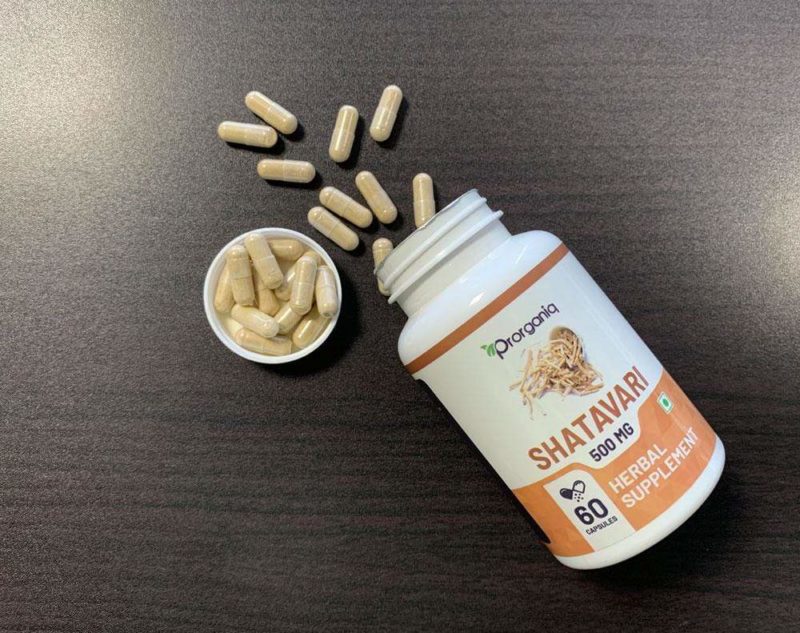
Talk to any Ayurveda practitioner; they will tell you that Shatavari is their staple. So why do they make this claim?
According to them, the herb possesses cooling and calming effects. These properties help balance and soothe the pitta and Vata (the two of only three doshas).
“What the heck? What do these terms mean?” You could be asking. Well, these are philosophical terms that refer to forces that can affect your general mood, energy level, and health.
So, what is Shatavari?
Shatavari goes by the scientific name Asparagus racemosus. Experts call it an adaptogenic herb. It means the herb helps people to adapt or cope with emotional and physical stress.
For this reason, Ayurveda practitioners and proponents consider it a health topic to boost vitality. Shatavari capsules have been associated with improved fertility and several health benefits in relation female reproductive system.

This article shall explore the benefits of Shatavari, its uses, and potential side effects (especially during pregnancy).
Proven Health Benefits of Shatavari
According to data, only a few human studies have been conducted to prove the health benefits. Most of these studies suggest that Shatavari may provide a few advantages. Additional research is needed to confirm these benefits.
Here are some of the main benefits:
- Improves women’s reproductive health
The most common traditional use of Shatavari is to improve women’s sexual health. However, a few studies prove this natural product can correct the hormonal imbalance that causes premenstrual syndrome and infertility.
A particular study published in 2018 in the authoritative Biomedicine and Pharmacotherapy journal suggested scientific evidence to support the above claims. Additionally, the report suggested that Shatavari capsules can help treat polycystic ovary syndrome, also known as PCOS.
- Reducing the symptoms of menopause
Menopause is an inevitable conclusion of the reproductive cycle. But, unfortunately, it is associated with many undesirable effects that can reduce a woman’s life quality.
Attempts to delay menopause therapeutically involve replacing the lost sex hormones in a process called hormone replacement therapy. Research suggests that using Shatavari extracts and derivatives can reduce and even reverse the symptoms associated with menopause.
- Has anti-aging effects
Aging, also called senescence, is a sure as the rising of the sun. But, since we cannot stop it, we can try to delay it. Evidence of studies conducted on Shatavari indicates that it can help slow down the aging process.
A study carried out in 2015 found that saponins in the herb can help reduce toxins called free radicles. These toxins accumulate in the body as a result of normal metabolic processes your body carries out daily. This interferes with skin quality leading to the wrinkling associated with aging.
Shatavari also prevents the breakdown and promotes the synthesis of collagen. Collagen is the protein responsible for skin elasticity. You can recall that reduction in skin elasticity is what causes wrinkling seen with advancing age.
- It can help you deal with blood sugar.
Diabetes type 2 is the consequence of poor glucose management by your body. In most cases, the problem arises from the inability of your body to use insulin. Insulin helps your cells to absorb glucose you get from diet from the bloodstream into the cells.
According to studies on Shatavari conducted in 2007, the herb may help maintain blood sugar. In addition, it is suggested Shatavari and its derivatives may promote insulin synthesis and secretion. How the herb achieves such function is a subject of further research.
- It prevents the formation of kidney stones.
Kidney stones are hard or stony deposits that may form in your kidney or kidneys. Sometimes, the stones stay put. However, the stones can be carried with the urine through the kidney and the ureters. This can lead to excruciating pain.
The culprit salt that causes renal stones is oxalate. We can define oxalate as compounds found in certain foods such as beets, spinach, and French fries.
A 2005 study conducted by a group of American scientists revealed that Shatavari root could prevent oxalate stones in rats. In addition, the herb increases the urine concentration of magnesium. Adequate levels of magnesium also prevent crystal formation.
- Use it to manage depression.
Depression and other mental health and emotional disorders can interfere with your daily life. Unfortunately, in a world full of stress, it may not be possible to avoid the things known to cause depression.
Based on Anxiety and Depression Association of America (ADAA) statistics, the major depressive disorder affects 16.1 million citizens. The worst thing is that the drugs used to treat the disorder are toxic with terrible side effects.
Shatavari capsules can help manage depression, according to the results of a study conducted in 2009 on rodents. It revealed that Shatavari has strong antidepressant effects without being toxic. It also promotes the secretion of crucial neurotransmitters that control brain communication.
Possible Side effects of Shatavari
A review of a study conducted in 2003 and published on Bioline International suggested that Shatavari is safe for use by anyone at any age. It said the herb is safe for both short-term and long-term use. In addition, the report suggested extracts of the plant can be used during pregnancy and breastfeeding.
However, further research is necessary before Shatavari capsules and other derivatives can be approved for pregnant and lactating women.
A few people around the world have reported some allergic reactions to Shatavari. An allergy to Asparagus also means you will react negatively to this herb. It would be best if you avoided it under these conditions.
If you have any allergic conditions such as hay fever, asthma, and so on, please avoid Shatavari. The common allergic reactions attributed to this Ayurvedic staple include:
- Skin rashes
- Rapid heart rate
- Difficulty in breathing
- Itchiness of skin and eyes
- Dizziness
Furthermore, Shatavari has been proved to have diuretic effects, promoting fluid loss through the kidneys. It means you should not take it with Lasix (furosemide) used in hypertension treatment.
Lastly, Shatavari has lowered blood sugar. While this effect may be beneficial if you have diabetes mellitus, it may cause serious hypoglycemia if you take it with other drugs used to lower blood sugar.
Conclusion
Shatavari is central to Ayurveda practice. Today, it is quickly gaining acceptance in mainstream therapeutics because of its numerous health benefits. Shatavari capsules contain pure extracts of the plant that can enable you to enjoy the health benefits of this essential traditional medicine.
While it may be associated with a few side effects which are majorly allergic, the herb has proved to have many benefits. The advantages greatly outweigh the risks. Therefore, you can try it to see how much it will do for you.



